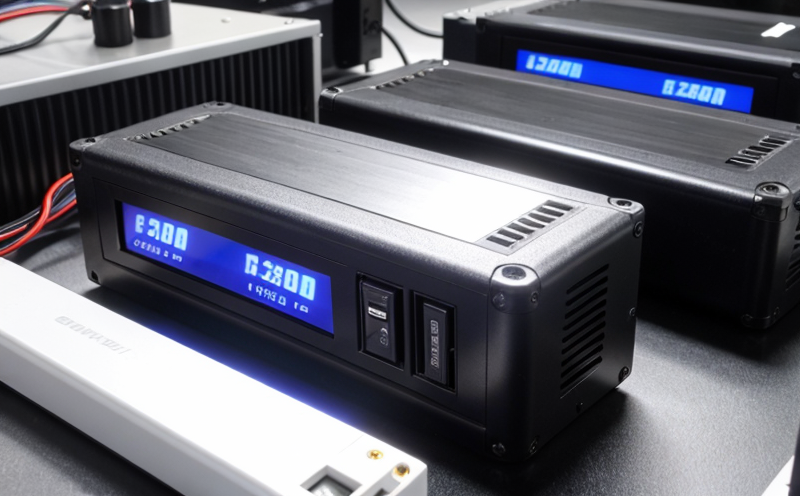IEC 62877-1 Electrolyte for Lead-Acid Batteries Performance Testing
The IEC 62877-1 standard is a critical document that defines the performance requirements and test methods for electrolytes used in lead-acid batteries. This standard ensures that manufacturers can produce reliable, high-performance electrolytes that meet stringent quality standards. The testing process outlined in this standard is essential for ensuring that the electrolyte's chemical composition, electrical conductivity, pH value, and other key properties are within acceptable limits.
The electrolyte plays a crucial role in the performance of lead-acid batteries by enabling ionic conduction during charging and discharging processes. Therefore, accurate testing and quality assurance are paramount for maintaining the reliability and longevity of these batteries. This service focuses on providing comprehensive performance testing of electrolytes according to IEC 62877-1.
The testing process begins with the collection of samples from various batches or lots. These samples must be representative of the production batch, ensuring that any issues are identified early in the manufacturing process. Sample preparation typically involves dilution and filtration to remove impurities before analysis. After preparation, a series of tests is conducted:
- Electrical conductivity measurement
- pH value determination
- Specific gravity assessment
- Viscosity evaluation
- Stability testing at different temperatures and time intervals
- Compatibility with lead-acid battery materials
The results of these tests are compared against the specified limits defined in IEC 62877-1. Any deviations from these limits indicate potential issues that need to be addressed by the manufacturer.
In addition to laboratory testing, this service also includes real-world application trials where the electrolyte is integrated into lead-acid batteries under controlled conditions. These trials help to identify any performance discrepancies in a practical setting and provide valuable insights for continuous improvement.
The importance of IEC 62877-1 cannot be overstated, especially as the demand for reliable energy storage solutions continues to grow. By adhering to this standard, manufacturers can ensure that their electrolytes meet stringent quality requirements, thereby enhancing the overall performance and reliability of lead-acid batteries.
Our laboratory utilizes state-of-the-art equipment and experienced personnel to conduct these tests accurately and efficiently. This ensures that our clients receive reliable test results, which are essential for making informed decisions about product development, quality control, and compliance with international standards.
Why It Matters
The performance of lead-acid batteries is directly influenced by the quality of their electrolyte. Poor-quality electrolytes can lead to reduced battery life, increased maintenance costs, and decreased overall efficiency. By ensuring that the electrolyte meets the stringent requirements set forth in IEC 62877-1, manufacturers can produce reliable and high-performance batteries.
Compliance with this standard is also crucial for meeting regulatory requirements and gaining market access to various regions around the world. Many countries have specific standards or guidelines that require compliance with international standards like IEC 62877-1.
In addition, adhering to these standards helps manufacturers differentiate themselves in a competitive market by offering products that meet the highest quality standards. This can lead to increased customer satisfaction and loyalty, as well as improved brand reputation.
Competitive Advantage and Market Impact
- Enhanced product reliability leading to increased customer trust and satisfaction
- Increased market share due to compliance with international standards
- Differentiation from competitors by offering high-quality products
- Potential for new business opportunities in regions that require IEC-compliant products
The ability to provide accurate and consistent testing results according to IEC 62877-1 can give manufacturers a significant competitive advantage. By ensuring that their electrolytes meet the highest quality standards, they can differentiate themselves from competitors and attract more customers.
In addition, compliance with this standard opens up new market opportunities in regions where such standards are required for import or sale of lead-acid batteries. This can significantly expand a manufacturer's reach and increase its overall market share.
Use Cases and Application Examples
| Use Case | Description |
|---|---|
| Data Center Backup Power Supply | Batteries in data centers are critical for maintaining operations during power outages. Ensuring the reliability of the electrolyte is essential to prevent downtime and protect sensitive equipment. |
| Off-Grid Solar Systems | In remote areas, off-grid solar systems rely on lead-acid batteries for energy storage. The quality of the electrolyte directly impacts the system's performance and longevity. |
| Automotive Starter Batteries | The reliability of automotive starter batteries is crucial for vehicle operation. High-quality electrolytes ensure consistent starting performance even under challenging conditions. |
| Vehicle Backup Systems | In vehicles equipped with backup systems, the quality of the electrolyte can affect emergency situations such as dead battery scenarios. |
These use cases highlight the importance of reliable and high-performance electrolytes in various industries. By ensuring that these electrolytes meet the stringent requirements set forth by IEC 62877-1, manufacturers can enhance the performance and reliability of their products.





